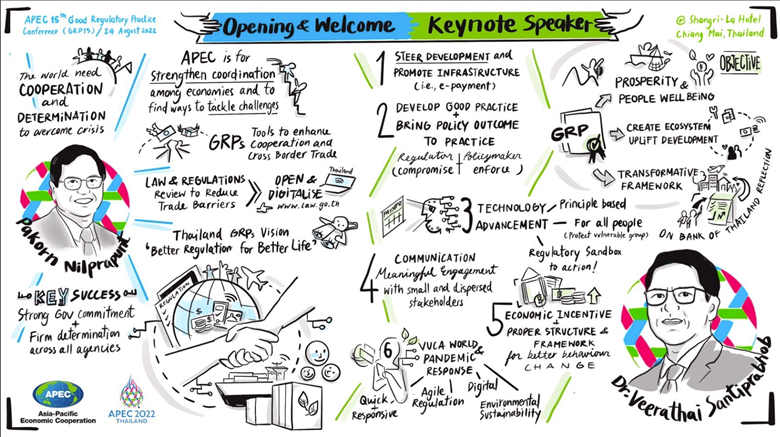
Agile governance and cross-border cooperation is a vital pandemic lesson
Trust has emerged as the most valuable currency for cooperation in the post-pandemic world - whether it is cooperation between governments and the public, between agencies, or across economies. It is a component of social capital, which is of vital importance with regard to social and economic relations, legal frameworks, and, ultimately, economic development, according to a recent APEC policy brief.
As governments across the region work together to emerge stronger from the pandemic, regulations have become an integral part of recovery for strengthening the economy. A transparent, accountable and certain regulatory environment not only sends positive signals to the international business community and invites foreign investment, it also builds trust between stakeholders, policymakers and the public. Acknowledging the fact that regulatory frameworks have been heavily tested during the pandemic, APEC member economies reiterated the importance of adopting Good Regulatory Practices (GRPs), a technical term for processes or methods to promote good governance in the regulatory process - a sort of quality standard.
"The COVID-19 pandemic has made us realize that the world is more complex and more connected than in the past," said Dr Veerathai Santiprabhob, a former governor of the Bank of Thailand, who opened an APEC conference in Chiang Mai late last year focused on regulatory practices in relation to the pandemic experience.
"A problem or crisis that originated in one place, one region, could easily and quickly spread out to all parts of the world," he said. "To overcome future crises, which are likely to become more and more challenging, we need cooperation and determination among all parties to find possible ways forward."
"One of the mechanisms that APEC has encouraged its member economies to enhance cooperation and cross-border trade is the use of GRPs," said Dr Veerathai. "By implementing GRPs, APEC members are required to review their laws and regulations with a view to facilitating trade by reducing trade barriers created by the differences in legal requirements of each member."
"Having said that, the clear benefits of GRPs are not confined to cross-border trade only, but we can also utilize GRPs to enhance the efficiency and efficacy of the government in addressing problems," he continued. "During the COVID-19 pandemic, the governments of many economies which have implemented GRPs when issuing laws and regulations were able to handle the crisis more effectively and lessen negative impacts on their people."
The pandemic revealed numerous challenges for implementing GRPs by member economies.
Governments were under pressure to respond quickly to keep pace with the fast-evolving pandemic, said Dr Manuel Gerardo Flores, Coordinator of the Regulatory Policy Program in Latin America of the Organization for Economic Co-operation and Development (OECD), who spoke at the same GRP conference. Regulations are born out of a problem that society needs to tackle, he said, and their formulation should be based on evidence, which is a product of a cycle of study, implementation and testing results. The pandemic left no time for any of it.
"There was no evidence," said Dr. Flores, "The world was full of uncertainty. It was a new virus. It was a new situation."
"So, the name of the game was: there is incomplete evidence, the government needed to act, so let's shorten all processes," he explained.
To enable timely policies and actions, member economies came up with a variety of regulatory responses, ranging from waivers or exemptions of regulatory requirements, shortening administrative processes, the inclusion of sunset clauses in crisis-related regulations, and adoption of digital technologies in regulation.
"Was this the right response?" asked Dr Flores. "Time will tell."
The main crisis is largely over and Dr Flores predicted usual practices would return soon, but he also advocated for the need to adopt more agile regulatory governance for eventual future crises, not just within borders but through international regulatory cooperation.
"If anything, the pandemic showed that there are really no borders. All borders are, as the lawyers say, fictional," he said. "In global crisis, we need global responses."
The two-day conference gathered experts, business representatives and policymakers from all over the APEC region, leading to recommendations and conclusions that benefitted from a multitude of perspectives.
There was general consensus that GRP and principles such as transparency, public consultation, and stakeholder engagement that have been in place for some time should return or remain relevant despite changing operating environments. At the same time, however, gaps in existing GRPs need to be addressed as economies emerge from the crisis.
Several critical elements need to be incorporated into good regulatory practices. Recommendations for APEC members which emerged from the conference can be summarized as follows:
A review and evaluation of COVID-19 responses
Policies and measures in force should be reviewed and updated in accordance with the evolution of the pandemic. There is also a need to conduct an impact assessment of legacy regulations from COVID-19, as well as evaluate their effectiveness to inform future decisions.
Adapting traditional tools to better accommodate unprecedented circumstances
Traditional management tools such as regulatory impact assessments, stakeholder engagement, and ex-post evaluations are proven applications in fast-changing environments. However, they were underutilized during the past crisis. They also need to be tweaked in terms of their flexibility and adaptability, which calls for a need to shift towards more agile and forward-looking approaches.
Embedding international regulatory cooperation into domestic frameworks
There is a spectrum of international regulatory options that economies can tailor to specific domestic situations, ranging from the unilateral adoption of good regulatory practices or international standards to various cooperative efforts that provide for the development of common regulatory positions and instruments.
Enabling greater experimentation through regulatory sandboxes
To harness the benefits of innovation and technology while upholding protection for people, many economies have adopted the concept of a regulatory sandbox which allows innovators to conduct live experiments in a controlled environment under a regulator's supervision.
Promoting the use of digital technologies in regulatory affairs
The COVID crisis has accelerated digital transformation across the public sector. Governments should capitalize on this trend to promote the use of digital technologies. Several cases from APEC economies have demonstrated how these can be used to improve regulatory processes-platforms that gather inputs from businesses to improve regulations, for example, and digital applications and online platforms for public service delivery.
APEC has a long history of advocating ongoing dialogue on good regulatory practice and developing resources to facilitate international regulatory cooperation to tackle transboundary issues. These discussions will continue in 2023 when the United States, as host of APEC, will steer conversations towards policies ensuring transparency and ethics in the process of policymaking.
In fact, the APEC Sub-Committee on Standards and Conformance will further the forum's GRP work in Palm Springs, this week, outlining specific policies, institutional arrangements, processes, technologies and tools that will advance the implementation in the APEC region. The forum is an ideal platform in keeping regulations and regulators effective, nimble and always relevant whatever crisis the region may face.
Download the 15th APEC Good Regulatory Practice Conference's Graphic Notes here.







